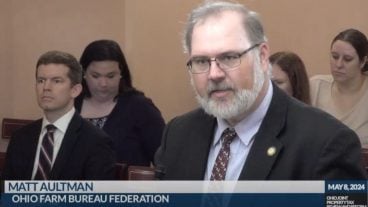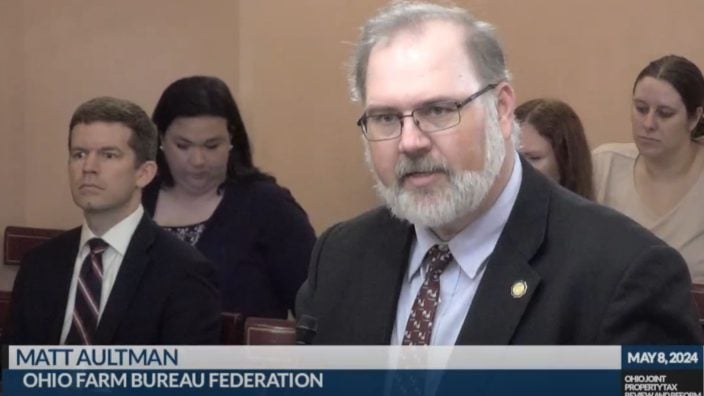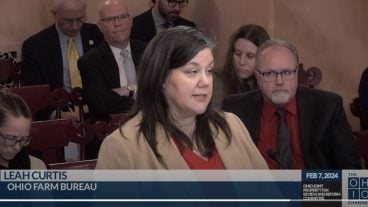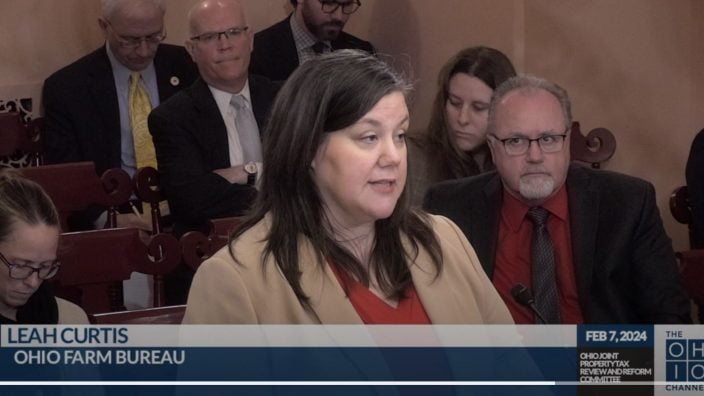Unusually early harvest putting Ohio produce growers in a pickle
An unusually warm February and March has Ohio produce crops maturing ahead of schedule, which impacts u-pick operations.
Read MoreFarm Bureau has joined in the conversation with policymakers and the Biden administration to make sure the agency has all of the information needed when new ideas that may have an impact on farmers across the country are introduced.
Farmers have been hit from all sides lately, from skyrocketing input and fuel costs to supply chain challenges. Throw in several U.S. Environmental Protection Agency regulations and rules and the hits keep on coming.
The Enlist herbicides ban, another rewrite of the Waters of the U.S rule and a plea to keep bolstering the Renewable Fuels Standard are on the minds of farmers across the country. Farm Bureau has joined in the conversation with policymakers and the Biden administration to make sure the agency has all of the information needed when new ideas that may have an impact on farmers across the country are introduced.
In response to the U.S. Environmental Protection Agency’s recent decision to prohibit the use of Enlist Duo and Enlist One herbicides in certain Ohio counties, Farm Bureau lead an effort, along with the Ohio Corn & Wheat Growers and the Ohio Soybean Association, to write a letter to EPA Administrator Michael Regan to voice their concerns about the new policy.
“You have a tool for farmers that was essentially taken away with no time to react to it,” said Brandon Kern, senior director of state and national policy at Ohio Farm Bureau. “Literally overnight the rules changed for that group of farmers in those Ohio counties.”
Twelve counties in Ohio are on the banned use list: Athens, Butler, Fairfield, Guernsey, Hamilton, Hocking, Morgan, Muskingum, Noble, Perry, Vinton and Washington, impacting nearly 270,000 acres across the state. Update: The ban has since been lifted.
The ag groups went on record with U.S. EPA Administrator Michael Regan by outlining in a letter agriculture’s concerns with the process and the result regarding the Enlist bans.
The Ohio congressional delegation and American Farm Bureau have been working together on the issue as well, as it affects counties across the country. That collaboration netted an audience with Rod Snyder, U.S. EPA’s senior ag advisor for Administrator Regan.
Discussions centered around the shortcomings of the process and the need to work with producer organizations to look at processes in the future.
The American burying beetle has triggered the ban in Ohio. Corteva, the parent company of Enlist, has turned over new data to the U.S. EPA which may end up being beneficial to farmers.
“We’re hopeful this additional scientific data about the impact on that species provides that mitigating standard for EPA to be able to remove these county bans,” Kern said. “It’s encouraging that they received and acknowledged that information.”
In February, Ohio Farm Bureau submitted comments to the U.S. EPA and the U.S. Army Corps of Engineers regarding the agencies’ proposed rewrite of the WOTUS rule. The changes would significantly expand the land mass regulated by the federal government and would lead to costly and complex permitting requirements that small businesses and farmers aren’t equipped to navigate.
The letter emphasized Ohio Farm Bureau and its members’ disappointment about the agencies’ proposed rule, and reminded how the current Navigable Waters Protection Rule, along with state-led efforts, was clearly protecting Ohio’s lakes, rivers and streams.
Ohio Farm Bureau recently provided comments concerning the U.S. EPA’s proposed rule regarding proposed Renewable Volume Obligations (RVO) for 2021 and 2022, as well as EPA’s proposal to retroactively adjust the already-finalized RVO for 2020.
The letter pointed out how renewable fuels have been a tremendous success story for the country and the rural economy and how the Renewable Fuel Standard has reduced the country’s dependence on foreign crude oil, reduced air pollution, increased farm incomes and provided good-paying jobs in rural America.
Kern noted that more than 30% of the corn grown in Ohio is used to produce ethanol. Kern and Ryan Yates, managing director of public policy American Farm Bureau, spoke about all these U.S. EPA challenges impacting farmers in depth on a recent Our Ohio Weekly.


An unusually warm February and March has Ohio produce crops maturing ahead of schedule, which impacts u-pick operations.
Read More

During his testimony, Aultman added that ensuring that agricultural property is valued for its agricultural potential and not development is critical to the continued success of Ohio agriculture.
Read More

The emergency fuel waiver to allow the sale of summer gasoline blends containing 15% ethanol will lengthen the period during which Americans can continue buying E15 from June 1 to Sept. 15.
Read More

Ohio Farm Bureau 2024 priority issues focus on business climate, regulatory environment, preserving Ohio’s farming heritage, healthy rural communities, and grassroots advocacy.
Read More

The law requires most businesses to report information about their beneficial owners, and the intent is to try to make it harder to illegally hide assets and commit financial crimes.
Read More

This allows for limited sale and distribution of dicamba OTT products that were already in the possession of growers or in the channels of trade and outside the control of pesticide companies as of Feb. 6, 2024.
Read More

Data shows there are fewer farms in the United States, yet more new, beginning and young farmers.
Read More

How will this impact Ohio farmers and what can be done to allow for use of the products that have already been purchased?
Read More

American Farm Bureau President Zippy Duvall stressed that it is imperative EPA expeditiously provide clarity to farmers and asked the agency to issue an existing stock order.
Read More

farmers are happy with the purpose and philosophy of the CAUV program, but all would prefer some more predictability in their values and more importantly, their tax bill.
Read More